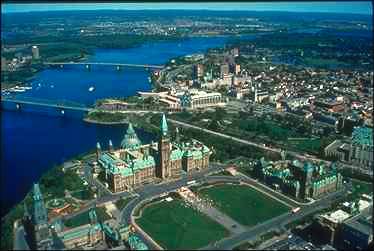Ottawa -
Activities
If you enjoy the outdoors, especially if you are a cyclist, you should definitely visit Gatineau Park just across the river from Ottawa. Bicycles can be rented during the summer months at the northeast corner of the Chateau Laurier. Ottawa and the surrounding area boasts over 170km of public paved trails on which you can run, bike, walk or rollerblade. These trails extend throughout Ottawa, to the Quebec side of the Ottawa River and lead all the way to Gatineau Park and beyond.
In winter, go skating on the longest outdoor skating rink in the world, the Rideau canal . Skates can be rented, and refreshments purchased, from vendors right on the ice. This is also a great place to enjoy a "beaver tail" which is a local specialty - a bit like funnel cake, often enjoyed with lemon and sugar.
In early spring (typically March), when the daytime temperatures are above freezing and night temperatures are below freezing, consider visiting a sugarbush for fresh maple syrup. There are many to choose from in the region if you have a car to drive out of the city.
Ottawa is host to over 60 festivals and events per year, including:
• Ottawa Jazz Festival in summer
• Bluesfest , also in summer
• The Fringe Festival , another summer offering
• Winterlude , winter fun featuring ice carving and snow sculptures
• The Tulip Festival , a spring bonanza of flowering bulbs, given annually by the Dutch government
• Canada Day , celebrate Canada's birthday in Ottawa
Education
The two comprehensive undergraduate universities in the city are Carleton University and the University of Ottawa . St. Paul's University is a seminary with ties to the University of Ottawa. There is also the Algonquin College and the Cité Collégiale .
Work
The Federal Government is the region's largest employer with the high-tech sector firmly in second place. Unless you are a Canadian resident, you will need a work visa to work in Ottawa.
Shopping
The Byward Market area of downtown Ottawa, located east of the Rideau Canal and the Chateau Laurier, is probably the area's best known shopping district. In summer, stalls selling fresh produce line the streets, but even in the middle of winter there are some hardy vendors braving the cold — and maple syrup bought here costs half the price of souvenir shops elsewhere in the city. Larger shopping malls include the Rideau Centre (downtown), St. Laurent Shopping Centre (East End), the Bayshore Shopping Centre and Carlingwood Mall (West End).
Stay safe
Ottawa is not a dangerous place, so if you use common sense it is as safe as any other city. There are many tourists in the city, especially in summer months, and there are very few incidents of robbery or assault.
Get out
• Montreal is 200 km (120 mi.) to the east.
• Toronto is 400km (250 mi.) to the southwest.
Links
 Ottawa is the capital of Canada. The city is situated along the Ontario side of the Ottawa River, opposite Gatineau, Quebec.
Ottawa is the capital of Canada. The city is situated along the Ontario side of the Ottawa River, opposite Gatineau, Quebec.Unique as a North American capital, the city is bilingual with the majority of the population speaking English and a significant number also speaking French. Ottawa is home to many of the world's cultures as thousands of immigrants from around the world now call Ottawa home. The city is probably best known as the nation's capital but has become one of the fastest growing cities in North America owing to the booming high-tech business sector.
Ottawa started as a humble lumber town, then called Bytown, named after Colonel John By who oversaw the construction of the Rideau Canal, much of which done by hand, between 1826 and 1832. Lumber mills were built along the Ottawa River in the mid-nineteenth century and those brought employment and wealth to the growing population. The center of action then, as now, was the Byward Market. While it's still the centre of the city's nightlife, it has changed appreciably from the rough and tumble early days of brothels and taverns.
In 1857, Queen Victoria chose Ottawa as the capital of Canada. During the latter half of the nineteenth century, the telephone was demonstrated to the Canadian public for the first time and the city was electrified. The first electric streetcar service was started in 1891. A menu from 1892 states that, "the first instance in the entire world of an entire meal being cooked by Electricity" was in Ottawa.
Today, the major economic sectors are the public service, travel and tourism and the high-tech industry. Ottawa has proudly remained a green city, and many residents make regular use of Ottawa's parks and green spaces. Many national attractions are located in Ottawa: Parliament Hill; the National Library and Archives; the National Art Museum; as well as the Museums of Civilization, Contemporary Photography, Nature, and Science & Technology.

